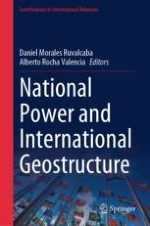2024 | OriginalPaper | Buchkapitel
6. The Core States in the International Geostructure
verfasst von : Carlos Pulleiro Méndez, Germán Patiño Orozco
Erschienen in: National Power and International Geostructure
Verlag: Springer Nature Singapore
Aktivieren Sie unsere intelligente Suche, um passende Fachinhalte oder Patente zu finden.
Wählen Sie Textabschnitte aus um mit Künstlicher Intelligenz passenden Patente zu finden. powered by
Markieren Sie Textabschnitte, um KI-gestützt weitere passende Inhalte zu finden. powered by
